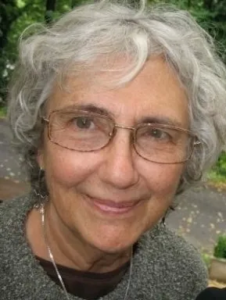Ma Lineal by Faith Holsaert (fiction ’82)
Fiction alumn Faith Holsaert’s memoir, Ma Lineal, was published in April by Wayne State University Press. Read an excerpt below:
From Ma Lineal
We walked into the cold dusk.
The café door with its swinging “open” sign admitted us to the hush of silenced conversation and the movement of stilling bodies. Everyone knew instantly what this was, a tableau in which each of us had an ordained role. We filed in and took seats at the counter. We were asked to leave. We did not. The manager flipped the sign on the door to CLOSED and called the police. I don’t know how long it took for the cops to arrive, though I do know it felt like forever, in that place where silverware was not clinking against china, where the cook stared through the pass-through window, where there must have been Black workers in the kitchen. Where the slightest change in equilibrium as we sat at the counter could have unleashed the white people at our backs.
We began to mutter to one another, little bits of barely voiced words, passing up and down the line.
Reggie and I, without words, which would have been dangerous, answered the question we had toyed with all afternoon: Might we perhaps be flirting with one another? And in code, the answer passed between us: As a matter of fact, yes, we were. Flirting with one another.
The police arrived with a fanfare of sirens.
We sang our fool hearts out, freedom songs all the way to jail, a stone block building that looked ancient, with three small windows on the second floor, two windows on the first floor flanking the door. We five women were placed in a cell, the floor and walls, as I remember, concrete, the beds metal bunks. The five men were across the hall. Grated openings in the cell doors allowed us to yell or sing to one another. We decided as a group that we would fast. We went to bed. I had never been on the Eastern Shore of Maryland at the butt end of the mid- Atlantic seaboard; I only knew two of the four women in the cell. I had never lain down in a bunkbed in a room with a concrete floor. I had never been locked up. My sister would unpack her Christmas stocking at our father’s; its shower of pistachios would stain her fingertips pink. My mothers and my sister would gather in the candlelight at Heilbroners’. Muni would whistle “Silent Night.”
Past midnight, I woke to singing. Below us, a handful of men and women, their faces craning up toward us, held candles and sang carols. In the dark, they looked small, and their voices were soft. They were faculty from the nearby HBCU. After we went back to bed, Peggy, Bonnie Kilston, Angeline Butler, who was a friend of Peg’s, and Diane Ostrowski from Baltimore. We must have talked in the dark, five young women not quite or barely into our twenties. I must have wondered about my mother, who would have received a phone call from a stranger. I must have thought about Reggie, whose voice had rung out above the others’ as our cells sang across the corridor to one another.
Reggie bailed out to organize local support and to publicize our case. This in the days when telephones and shoe leather were the technology. A week later, we were bailed out. We boarded a bus loaded with Baltimore supporters and were driven to a Black church in nearby Cambridge, where hundreds had gathered. This is the work that had been done while we stayed in jail. The Black community on the Eastern Shore of Maryland had a long and proud history of civic engagement. They had voted and participated in segregated local gov- ernment since the 1800s; they owned businesses. They had set down long roots. Churches and schools and even an HBCU in Princess Anne.
That was my first mass meeting. The sound and motion, the singing, the exhortations—what a rush. Those of us who had fasted must have been fed; maybe the community had prepared food for everyone. Perhaps those professors who had sung to us were there. When the last song was sung and the last “amen” called out, we boarded the bus and were driven through the night of the Eastern Shore toward Baltimore. Reggie and I sat together, talking and laughing and napping and kissing through the hours, until we crossed the bridge back over the Chesapeake Bay, retracing our route from the time before our arrest. The sun rose as we descended the slow curve of the bridge to earth, the sun at our backs and everything—everything—light filled before us.




